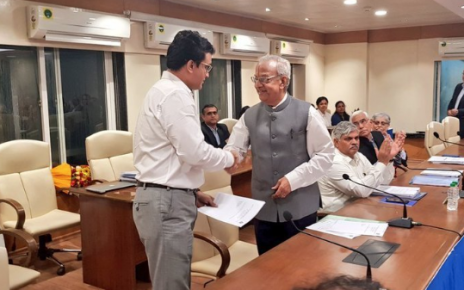Union Health Minister highlights the need for capacity building and sensitization of all cadres of personnel working in health facilities in public as well as private sectors at all levels of healthcare delivery system
Prime Minister Shri Narendra Modi also has stressed on the need of regular fire safety audits of the institutions and to prevent the disasters before they occur: Shri Nadda
“Lack of sensitivity towards disaster and fire preparedness leads to complacency and complacency further leads to carelessness that proves to be a spark of fire, a spark of disaster”
iGOT course on ‘Fire Safety in Healthcare Facilities’ launched during the event
Best performing States/UTs during ‘Fire Safety Week’ felicitated
Union Minister for Health and Family Welfare, Shri Jagat Prakash Nadda, inaugurated the 2nd National Workshop on ‘Health Sector Disaster Preparedness and Response’ & ‘Fire Safety in Healthcare Facilities’, at Dr Ambedkar International Centre, New Delhi, today. The workshop by Disaster Management Cell of the Union Health Ministry is being organized as a culmination of various activities organized by the Ministry as part of ‘Fire Safety Week’ in coordination with Disaster Nodal Officers from all States/UTs.
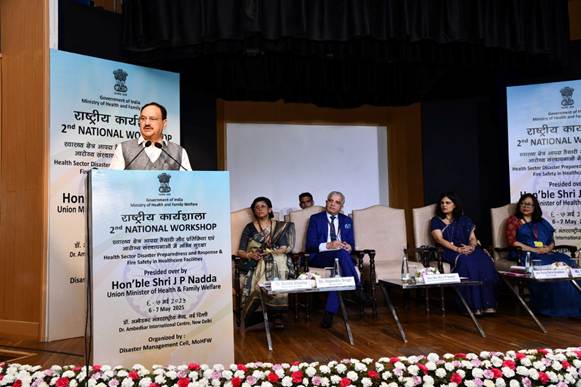
During his address, Shri Nadda underlined the continuous and proactive efforts of the Ministry towards disaster preparedness and fire safety, and stated that “the Ministry has been issuing various advisories, checklists etc. to all States/UTs and with time we have realized that we can move further in this direction.”
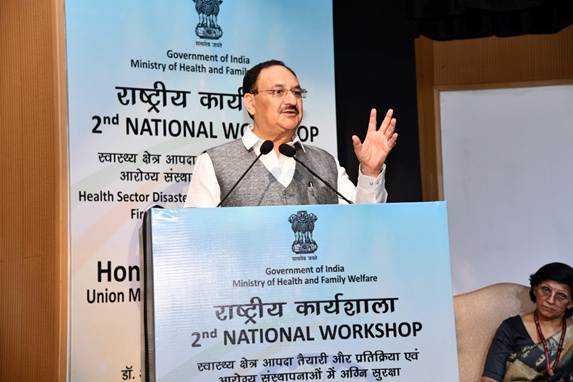
Highlighting the importance of the workshop, Shri Nadda stated that “this second workshop shows the commitment of the Health Ministry towards disaster and fire preparedness in healthcare facilities”. He also underlined that “we need to make our health facilities more resilient and resistant towards disaster and fire incidents. And that’s why it’s necessary to organize such disaster management workshops regularly.”
Shri Nadda emphasized that “we should focus on the preventive part of the disasters so that uninterrupted, comprehensive and quality health services can be ensured and we can stay vigilant; mitigate and address unforeseen situations.”
Underlining the increased responsibility of healthcare facilities, Shri Nadda added that “since we work with high-load equipment and highly inflammable materials like oxygen and chemicals that not only save lives, but also are inflammable and might cause a hazard. Therefore, there is a need of increased sensitization towards them.”
Urging all the stakeholders to contribute to this duty, Shri Nadda stated that “the responsibility lies not only with the top tier officials but also with the grassroot workers and paramedics.” Union Health Minister also underlined on the need to increase the confidence of the healthcare workers regarding disaster-response, for which he stressed on the necessity of practical knowledge and training along with the theoretical knowledge.
Shri Nadda emphasized that “Prime Minister Shri Narendra Modi also has stressed on the need of regular fire safety audits of the institutions and to prevent the disasters before they occur”.
Shri Nadda stressed on the need of sensitivity towards fire hazards and disaster preparedness in the healthcare facilities and urged all to be very cautious and clear about the sensitivity dimension along with regular fire safety audits as “lack of sensitivity towards disaster and fire preparedness leads to complacency and complacency further leads to carelessness that proves to be a spark of fire, a spark of disaster”.
Shri Nadda congratulated all the States/UTs, officers and stakeholders for their active participation during the ‘Fire Safety Week’ that was organized from 21st to 25th April, 2025. Applauding the efforts of all States/UTs. Stressing on the need for collective actions, Union Health Minister highlighted the need for capacity building of all cadres of personnel working in different types of health facilities in public as well as private sectors at all levels of healthcare delivery system.
Shri Nadda also added that “this workshop is not only for government hospitals but for the entire healthcare landscape of the country including private hospitals, primary health centres, nursing homes, maternity centres, Ayushman Arogya Mandirs and preventive facilities.”
Shri Nadda also expressed his expectations that the two-day intensive consultation during the workshop will result in action-oriented recommendations that will improve the resilience and responsiveness of healthcare facilities not only against fires but with an all-hazard approach thus ensuring that health facilities continue to provide care when their services are needed the most.
Addressing the gathering, Union Health Secretary, Smt. Punya Salila Srivastava stressed on the need to go over and beyond the compliance to regulatory norms and continue to strive towards a culture of fire prevention and preparedness while encouraging comprehensive disaster management planning and regular exercise of such plans at all levels.
Stressing on the importance of preparedness of health facilities during disaster or fire incidents, Smt. Srivastava stated that “at time of disaster health facilities are the harbinger of hope for all those who have been affected by the disaster. Therefore, disaster management and particularly hospital disaster management becomes very important.” “Preparedness is the core element of ensuring that we meet each and very incident in effective manner”, she further added.
Smt. Srivastava also underlined that “considering the onset of summer, it is important to focus on fire safety in hospitals.”
An iGOT course on ‘Fire Safety in Healthcare Facilities’ launched during the event. Best performing States/UTs during ‘Fire Safety Week’ were also felicitated during the event.
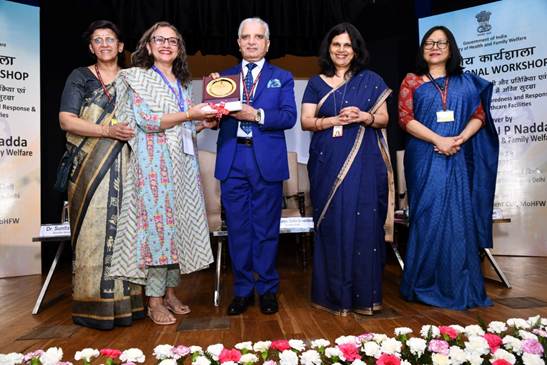
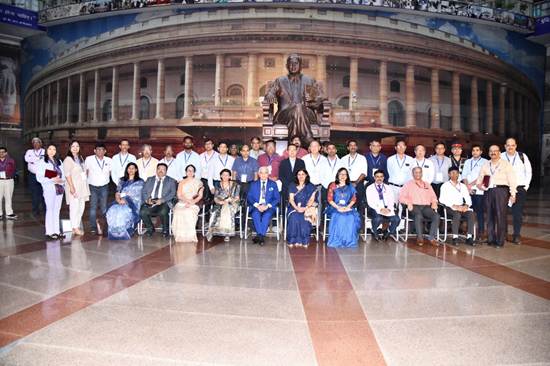
Ms. LS Changsan, Additional Secretary (Public Health), Dr. Sunita Sharma, Director General of Health Services, Sh. Rajendra Singh, Member and HoD, National Disaster Management Authority (NDMA) were present at the occasion. The event was also attended by senior officials/experts NDMA, National Institute of Disaster Management; Bhabha Atomic Research Center; Directorate General Fire Services, Civil Defence & Home Guards; National Fire Service College, Nagpur; National Center for Disease Control; AIIMS New Delhi, Central Design Bureau; WHO– India Country office and representatives of various Central Government hospitals.



